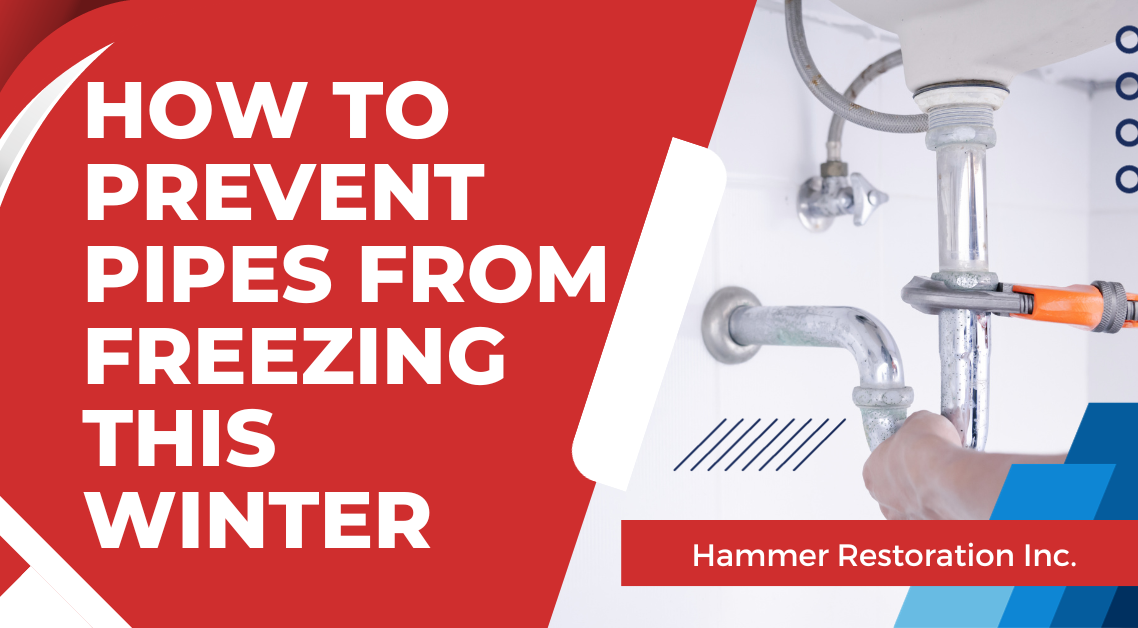Winter brings its own set of challenges, and one of the most common and potentially damaging issues homeowners face is frozen pipes. When temperatures drop below freezing, pipes can freeze and, in severe cases, burst, causing significant water damage and costly repairs. Let’s discuss how to protect your pipes from freezing this winter, so you can save money on preventable repairs.
Why Pipe Freezing is a Problem
Frozen pipes are a problem for several reasons. When water freezes, it expands, putting immense pressure on the pipe walls. Over time, this pressure can cause the pipe to crack or burst, leading to leaks and water damage when the pipe thaws. Additionally, frozen pipes can disrupt your daily routines, leaving you without access to water for cooking, cleaning, and bathing.
Beyond the immediate inconvenience and expense of repairing burst pipes, frozen pipes can also lead to mold and mildew growth due to the moisture released when they thaw. This can result in further damage to your home and potentially health-related issues for you and your family.
How to Protect Pipes from Freezing
Preventing frozen pipes starts with proper insulation. Insulating exposed pipes, especially those in unheated areas like attics, basements, and crawlspaces, can go a long way in protecting them from the cold. Use insulation sleeves or wraps to cover the pipes and reduce heat loss.
Sealing any gaps or cracks in your home’s exterior, such as around windows, doors, and foundation walls, can also help prevent cold air from entering and affecting the pipes. Additionally, keep garage doors closed, especially if there are water supply lines running through it.
How to Prevent Frozen Pipes
To prevent frozen pipes, consider the following tips:
- Maintain a consistent temperature: Keep your home adequately heated, and set your thermostat to a temperature above freezing, even when you’re away.
- Open cabinet doors: In areas with exposed pipes, like under sinks, open cabinet doors to allow warm air to circulate around the pipes.
- Let faucets drip: On particularly cold nights, allow faucets to drip slowly. Running water is less likely to freeze.
- Disconnect outdoor hoses: Before winter, disconnect and drain garden hoses, and shut off the outdoor water supply. Consider insulating outdoor spigots.
- Install pipe insulation: For added protection, install pipe insulation on both hot and cold water pipes in vulnerable areas.
If You Discover Frozen Pipes
If you suspect that your pipes have frozen but have not yet burst, take immediate action to prevent further damage:
- Keep the affected faucet open to allow water to flow when the pipe thaws, relieving pressure.
- Apply heat to the frozen area using a hairdryer, space heater, or warm towels. Start from the faucet end and work your way toward the frozen section.
- Do not use open flames or high-temperature heating devices, as they can damage the pipe.
- Contact a professional plumber if you’re unable to thaw the pipes yourself or if you discover a burst pipe.
Preventing frozen pipes is essential to avoid the inconvenience, expense, and potential damage they can cause. By insulating, sealing gaps, and taking proactive measures, you can protect your home’s plumbing system from the freezing temperatures of winter. If you do encounter frozen pipes, act promptly and cautiously to minimize the risk of bursting and water damage. Winter can be challenging, but with the right precautions, you can keep your pipes and your home safe and warm throughout the season.
Need help a frozen pipe? Contact the experts at Hammer Restoration.

